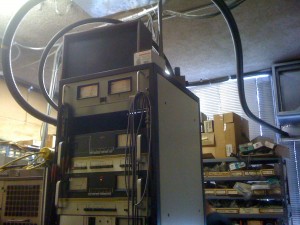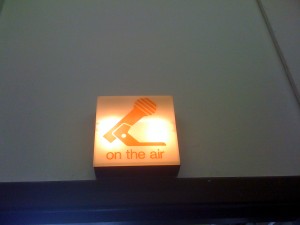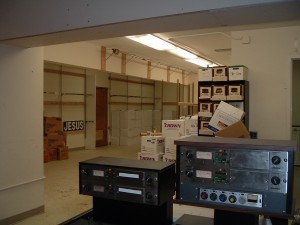Over the past 10 days, the lawyers for Friends of KUSF have been delving into the hundreds of pages of documents that were submitted in response to the FCC’s recent letter of inquiry into the pending sale of college radio station KUSF to Classical Public Radio Network (CPRN). As I recounted in my story yesterday, the joint response from University of San Francisco and CPRN contains not only some major omissions, but also some contradictory (and perhaps deceptive) information about the day-to-day operations of KUSF.
In their comments to the FCC filed yesterday, Friends of KUSF lawyers Alan Korn and Peter Franck argue that USF and CPRN have not been forthright in their answers and, with that in mind, they are requesting an “oral, evidentiary hearing” in order to not only determine the veracity of the USF/CPRN response, but also to find out whether or not USF has been in control of KUSF since the January 18, 2011 shut down (including whether or not they’ve had a staffed main studio) and if they have allowed CPRN to conduct potentially illegal fundraising and underwriting activities over the KUSF airwaves.
The lawyers for Friends of KUSF write,
“USF and CPRN…have placed the Commission and the interested parties in a difficult position, by presenting a Joint Response that is fragmentary, incomplete, and evasive. Given the complexity of the inquiry, and rapid turnaround to respond, some gaps and deficiencies would be understandable, even inevitable. But the Declarations of Charles Cross, Michael Bloch, Brenda Barnes, USF President Father Privett and others, submitted here, have been crafted with the obvious intent not to shed light on the matters in issue. The Applicants have also refused to produce key documents, or even to explain why these have not been produced.”
They further argue that “The few substantive documents produced by Applicants suggest that they have either misrepresented facts or lack candor, or both…” and go on to state that the included “documents strongly support Petitioner’s claims that there has been a premature transfer of Station control and that the Public Service Operating Agreement…fails to comply with Commission rules and policies, including rules regarding underwriting, underwriter announcements, and third-party solicitations.”
In their comments, they refute USF’s claim that it has maintained the ability to originate programming from the USF campus since January 18, 2011. On that date, KUSF was shut down and a feed from KDFC began airing over 90.3 FM. Additionally, two staff members were put in charge of KUSF 90.3 FM and the former staff were transitioned to positions with KUSF.org. Michael Bloch, an Associate Professor in Psychology and the Associate Dean for Social Sciences at USF became the Chief Operator of KUSF on January 18 and is now in charge of radio operations. The other new KUSF staff member is Bloch’s assistant Brigid Rose Torres.
Friends of KUSF’s comments to the FCC suggest that USF has not maintained control of the terrestrial station and that the two people currently in charge of it are not qualified to be running a radio station. They quote from several email exchanges in which it would appear that Bloch is unfamiliar with radio operations. In this email string from January 19, 2011, former KUSF General Manager Steve Runyon alerts Bloch to some major technical issues at the station that require the attention of the Chief Operator:
Steve Runyon: “The phone line feed to the transmitter went down a few minutes ago. An ITS representative came to check but couldn’t get in the transmitter room. The transmitter is presently running unmodulated which is against FCC regulations. There is also a requirement for 24 hour/day access to engineers…The Chief Operator of KUSF-FM is ultimately responsible for this. Have you extracted yourself from that job yet?”
Michael Bloch: “Steve – Up until yesterday you were the one responsible for technical operations. Are you willing to remain in that capacity through the time period of the sale? Obviously this would be tremendously helpful. I will be in charge of keeping/showing the FCC file. Give me a call and let’s talk.”
Friends of KUSF argue that these emails show that “Bloch lacks the basic qualifications as the Licensee’s Chief Operator and that he actively sought to avoid taking on those technical responsibilities.” They also call into question Bloch’s statements that USF could originate programming from its studio and transmitter site following the dismantling of the old KUSF studio in Phelan Hall, arguing that declarations by other individuals (who have expertise in radio) contradict his claims. Additionally, in his role, Bloch is supposed to oversee and approve all programming being aired by CPRN and Friends of KUSF saw no evidence that Bloch was monitoring CPRN’s broadcasts. In fact, as CPRN’s Brenda Barnes pointed out in a May 2011 email, Bloch provided no notification to CPRN about a power outage at the transmitter site which left the station off the air for several days.
In their comments, Friends of KUSF include a declaration by USF Media Studies Professor Dorothy Kidd (who has a background in radio), in which she argues that when she visited the KUSF transmitter site on August 5, 2011, it did not include “the equipment necessary to originate programming.” She further explains that the rooms apparently being set aside for the new KUSF studios did not appear to be occupied or operational. She states:
“I have been told by USF staff that the new KUSF production studio will be located in Kalmanowitz Hall, room 314, with the Master Control Room in Cowell 416…
On Monday, August 8, 2011, I visited Kalmanowitz 314, I observed a desk with one home stereo stack, not plugged in, and a laptop computer on it, as well as items in storage. I saw no sign whatsoever of any equipment connecting it, or potentially connecting it with the KUSF transmitter. KUSF staff affirmed this.”
Kidd also points out that the site of the future KUSF Master Control Room in Cowell 416 currently contains a garbage can and no broadcast equipment. She also states that the Media Studies Lab, which USF and CPRN argue is capable of originating KUSF programming, is “used primarily for video production” and that the affiliated audio studio and audio control rooms “are primarily used for storage” and she “saw no sign of active use.” Several others offered up statements confirming what Kidd saw. In another declaration, former KUSF staff member Robin Nordling states that after touring the Media Studies Lab with former KUSF General Manager Steve Runyon on August 5, 2011, “Runyon confirmed that this room was not equipped to broadcast to the transmitter.”
Beyond their concerns about oversight of the station and the lack of a main studio, Friends of KUSF also found the USF/CPRN response to the FCC to be incomplete. They argue that USF President Privett should have provided much more documentation than he did, stating that his claim that no documents exist is “preposterous” and “implausible.”
In its letter of inquiry, the FCC raised questions about CPRN’s Public Service Operating Agreement (PSOA), especially in light of the monetary compensation provided to USF. According to FCC rules for non-commercial educational FM stations, on-air fundraising can only be done on behalf of the station and can not be done for outside groups. This ban has been lifted occasionally by the FCC, specifically in instances when the FCC allowed non-commercial stations to raise funds for relief efforts following natural disasters in Japan, Haiti, and New Orleans and following the September 11 terrorist attacks.
Additionally, the FCC allows that, “A noncommercial educational FM broadcast station may broadcast programs produced by, or at the expense of, or furnished by persons other than the licensee, if no other consideration than the furnishing of the program and the costs incidental to its production and broadcast are received by the licensee.” With that in mind, the FCC asked USF and CPRN to “address specifically how the PSOA does not violate the prohibition on third-party fundraising, given that the PSOA permits CPRN to be the Station’s sole programmer and to retain all donations, underwriting receipts, and other Station support during the PSOA term.”
CPRN denies that any third-party fundraising has occurred over KUSF. Yet Friends of KUSF takes issue with that, pointing out that an arrangement in which a third-party pays a monthly fee in order to control both programming and fundraising works to “eviscerate both the underwriting rules and the core nature of the noncommercial service.” They further argue that CPRN’s recent move to modify the PSOA by eliminating the monthly compensation makes the arrangement at KUSF even more problematic. They state, “In so doing, they have created a situation where all fundraising revenue from the third-party programmer remains with the programmer. If anything, this depicts an even more dangerous and unlawful course than the former plan for CPRN to pay the Licensee a fee. Under the revised plan, all revenue, all resides with the PSOA programmer.”
In its request for an evidentiary hearing, the lawyers for Friends of KUSF suggest that the following issues still need to be explored more fully:
1. To determine whether or not the Licensee made an unauthorized or premature transfer of control of Station KUSF;
2. To determine whether or not the Public Service Operating Agreement…complies with commission rules and policies regarding underwriting, underwriter announcements, and third-party solicitation;
3. To determine whether or not the Parties have misrepresented facts or lacked candor in their application or in their responses to the Letter of Inquiry
It’s unclear how long it will take the FCC to respond to this request and to USF/CPRN’s response to the Letter of Inquiry; but it does seem on the surface that there are many lingering questions for USF and CPRN to address.
***
Complete Radio Survivor coverage about the proposed sale of KUSF can be found here. I also wrote about my reaction to the KUSF shut down and to the Save KUSF Multi-Station Live Broadcast on Spinning Indie. My article chronicling my KUSF field trip 2 years ago is housed there too. For more on the bigger picture of college radio station sell-offs, see my December 2009 piece “Cash-strapped Schools Turn Their Backs on College Radio“. And, for a quick overview of the situation at KUSF, see my article, “The Story Behind the KUSF Shutdown” on PopMatters.





